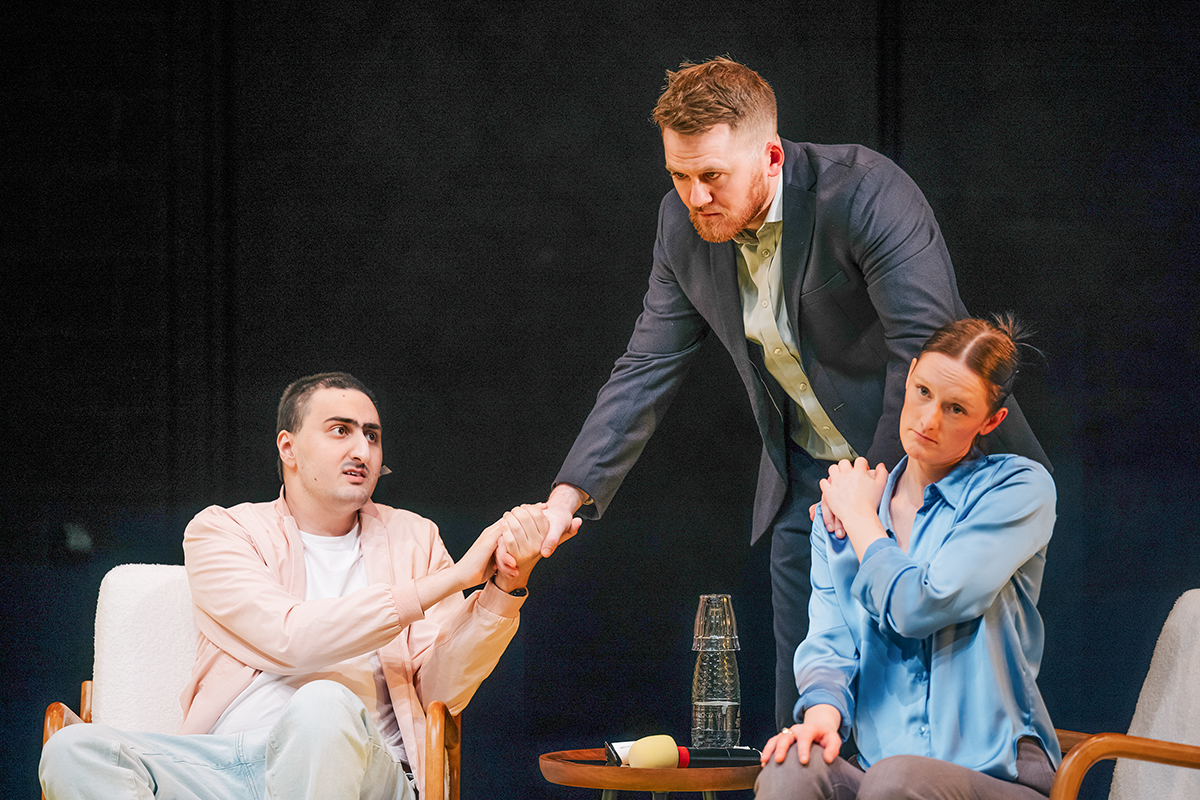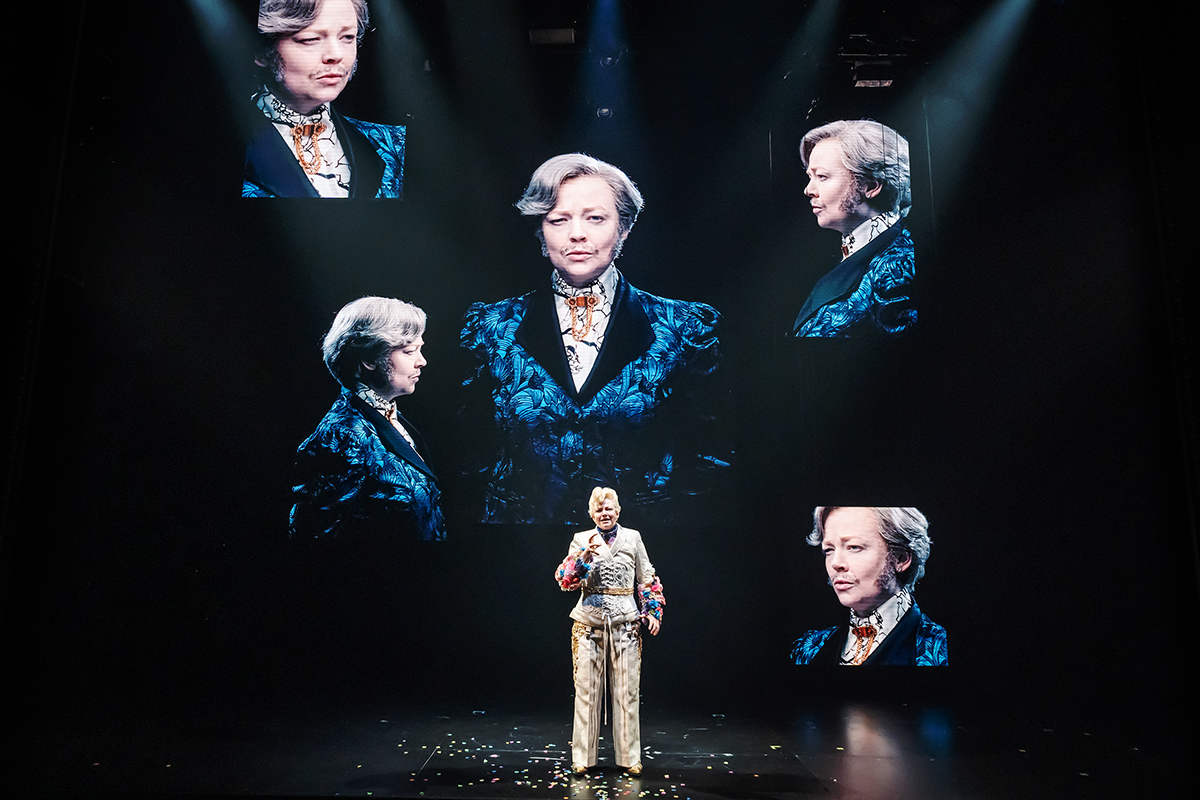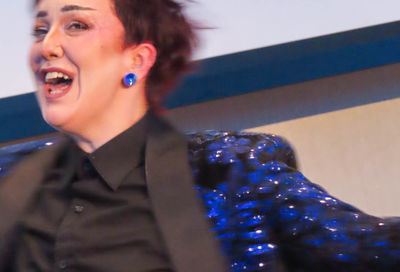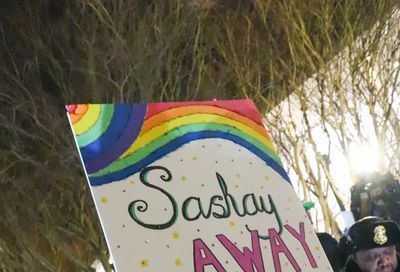Storm Troopers: Baby Screams Miracle at Woolly Mammoth (Review)
Woolly Mammoth's atmospheric production of Clare Barron's stark examination of faith yields less than blessed results
By André Hereford on February 16, 2017 @here4andre

A massive, raging storm bears down on a small, eastern Washington state town. Devoutly Christian and pregnant mother Carol (Kate Eastwood Norris) and her equally devout husband, Gabe (Cody Nickell), give thanks to the Lord for their blessings and pray that He will protect their home and family from the ravages of the coming tempest. As becomes apparent relatively quickly, it’s with some good judgment that Carol and Gabe should put their faith and fate in God’s hands: it might take a miracle to survive the onslaught of gale force winds, biblical rains, fallen trees, storm-tossed deer, and the unexpected arrival of their adult daughter, Cynthia (Caroline Dubberly), who also happens to be very pregnant with her first child in Clare Barron’s Baby Screams Miracle (![]()
![]()
![]() ), now at Woolly Mammoth.
), now at Woolly Mammoth.
Since Gabe can’t seem to fix anything around the house without breaking something else — usually some part of his body — it’s a good thing Carol’s sturdy mother, Barbara (Sarah Marshall), is on hand to help batten down the hatches and keep an eye on the couple’s nine-year old daughter, Kayden (Mia Rilette). As the storm hits, bringing floods and power outages, the loving but fractured family huddles together, forced to rely on each other for safety, mostly united in their faith that the Lord will see them through any ensuing devastation. They will need more than prayer, however, when close quarters, frightening circumstances and Cynthia’s inscrutably aggressive behavior, especially towards young Kayden, all threaten to stir up more dirt and devastation than any random weather event. These are extreme times, as Grandma Barbara wisely remarks.
Howard Shalwitz stages the extremely windswept action via an evocative mix of multi-layered lighting, sound and video design (crafted by, respectively, Autum Casey, Palmer Hefferan and Jared Mezzocchi), abetted by wind machines and good, old-fashioned physical comedy. The dynamic presentation of the characters’ hostile environment adds a storybook quality of wonder and excitement to what feels like a grown-up fable about the faithful besieged by disasters both natural and familial.
A centerpiece image in Shalwitz’s production is a miniature model of Carol and Gabe’s wood-frame house, which succumbs to gusty winds and, hoisted by wires, takes off like Auntie Em’s farmhouse up, up, up over the stage. Later, in its oddly timed descent back down to the stage, the model house resembles nothing so much as Spinal Tap‘s tiny Stonehenge slowly, comically coming to rest at the actors’ feet. Given the effectiveness of the multi-media scene-setting, the dwarf house seems a misstep.

Barron pokes at the existential angst of bringing new life into an uncertain world, as well as the ordinary perils of being a parent (“It’s hard, motherhood.”). With Cynthia’s strange behavior — particularly in an uncomfortably intimate, teasing game she introduces to Kayden — the play raises the decidedly more sinister possibility that some long-past or recent sexual abuse occurred in the family. But, as darkly intriguing as that possibility and its ramifications might be, the family’s secrets and tricky relationships ultimately are hard to pin down, due in no small part to deliberate obfuscation on Cynthia’s part, and the play’s too-opaque view of other characters’ motives beyond surviving the storm.
A bouncy succession of scenes, staged often as ying-yang duos (Carol and Gabe, Cynthia and Kayden, Gabe and Cynthia) pile up, as the family’s faith is tested by death, destruction and Gabe’s accident-prone attempts to secure their lives and property. Yet the underlying purpose doesn’t manifest in a particularly moving fashion, despite each cast member seizing their moment to shine.
Woolly Mammoth vets Norris and Nickell bring a compellingly salt-of-the-earth quality to Carol and Gabe, rendering their faith in God and commitment to each other as the pillars of a sweet, loving marriage of like-minded individuals. Longtime company member Marshall is a total delight channeling Barron’s looping, occasionally Beckettian rhythms through the persona of an amusingly with-it and folksy grandma. The subtle implication that, despite her grandmotherly appeal, Barbara might be the damaged root of an unhealthy family tree, comes through vaguely, yet powerfully enough to make the point.
Far more forceful in making her points, Dubberly’s Cynthia, full of rage and pain and reproach, elevated by the actor’s often melodic delivery, supplies much of the requisite tension and danger. Cynthia is the storm that bears the most ill winds, and Dubberly captures the hail of emotions that stir her to incite trouble. Unfortunately, a few fine performances and one miniature, floating house are not enough to connect this play’s disjointed narrative.
To Feb. 26 at Woolly Mammoth, 641 D St NW. Tickets are $20 to $64. Call 202-393-3939, or visit woollymammoththeatre.net.
‘Glengarry Glen Ross’ Is An Abusive Night of Theater
A barrage of racial epithets, mean speech, and misogyny permeates David Mamet's "Glengarry Glen Ross," in its third Broadway revival.
By Ryan Leeds on April 6, 2025
You would think that, by now, reasonable theatergoers would be exhausted by angry, self-serving bloviates who unleash profanities and cruel language on each other and anyone within earshot.
Obviously, there is more demand for it, as David Mamet's 1984 Pulitzer Prize-winning Glengarry Glenn Ross is back on Broadway for a third time.
And, like the unwitting suckers who fall into the clutches of this predatory group of real estate sharks, audiences are quick to drop top dollar to see a starry cast comprised of Bob Odenkirk as Shelley Levene, a past-his-prime salesman looking to increase his numbers, Bill Burr as Dave Moss, another older sales guy who huffs and puffs like the big, bad wolf, and Kieran Culkin as hotshot Ricky Roma, a slick smooth talker who has no time for excuses.
‘It’s a Motherf**king Pleasure’ is a Breath of Fresh Hilarious Air
Woolly Mammoth's funny and subversive "It's a Motherf**king Pleasure" is a joyously provocative evening out.
By Kate Wingfield on March 22, 2025
Arriving at a particularly tense time for the nation's capital, Woolly Mammoth's funny, subversive It's a Motherf**king Pleasure is a breath of fresh air. It's inoculated in that this is British-born and performed theater -- and the Brits really do get something of a pass when it comes to the kind of irreverence that would otherwise raise eyebrows and hackles.
Indeed, this special brand of immunity is tested in the first few frenetic minutes of Motherf**king where all energies are spent trying to decipher whether it's okay to laugh or if this is some kind of awareness-raising exercise (or, in other words, a trap) for the well-intentioned but woefully-not-getting-it.
Sarah Snook is Astonishing in Broadway’s ‘Dorian Gray’
'Succession's' Sarah Snook arrives at the Music Box Theater, bringing all 26 of the Oscar Wilde novel's characters along for the ride.
By Ryan Leeds on April 16, 2025
Obsession with eternal youth has always been a hot topic.
Theatergoers who can't get enough of the theme are in luck, as three New York shows prominently feature the idea of enduring beauty: a Broadway stage adaptation of the 1992 comedy Death Becomes Her has two dueling divas battling it out in comic fashion after drinking a potion that halts the aging process.
Downtown, meanwhile, a Faustian deal is brokered between a devil named Mephisto and a bank president where the financier can relive his years in one night in the immersive production entitled Life and Trust.
Support Metro Weekly’s Journalism
These are challenging times for news organizations. And yet it’s crucial we stay active and provide vital resources and information to both our local readers and the world. So won’t you please take a moment and consider supporting Metro Weekly with a membership? For as little as $5 a month, you can help ensure Metro Weekly magazine and MetroWeekly.com remain free, viable resources as we provide the best, most diverse, culturally-resonant LGBTQ coverage in both the D.C. region and around the world. Memberships come with exclusive perks and discounts, your own personal digital delivery of each week’s magazine (and an archive), access to our Member's Lounge when it launches this fall, and exclusive members-only items like Metro Weekly Membership Mugs and Tote Bags! Check out all our membership levels here and please join us today!
The Magazine
-
Most Popular
 MISTR's Free DoxyPEP Leads to Huge Drop in STI Rates
MISTR's Free DoxyPEP Leads to Huge Drop in STI Rates  Signature Honors Mandy Patinkin in Emotional Celebration
Signature Honors Mandy Patinkin in Emotional Celebration  Gay Army Reserve Officer in Uniform Sex Video Scandal
Gay Army Reserve Officer in Uniform Sex Video Scandal  'Gray Pride' Protests Hungary's Ban on Gay Pride Marches
'Gray Pride' Protests Hungary's Ban on Gay Pride Marches  Sarah Snook is Astonishing in Broadway's 'Dorian Gray'
Sarah Snook is Astonishing in Broadway's 'Dorian Gray'  Hugh Bonneville Delivers a Show-Stopping Vanya
Hugh Bonneville Delivers a Show-Stopping Vanya  Becca Balint: The Pride of Vermont
Becca Balint: The Pride of Vermont  Jared Polis Signs Law Repealing Colorado's Gay Marriage Ban
Jared Polis Signs Law Repealing Colorado's Gay Marriage Ban  Air Force Reverses Ban on Pronouns in Email Signatures
Air Force Reverses Ban on Pronouns in Email Signatures  A Potent (and Pricey) 'Good Night, And Good Luck'
A Potent (and Pricey) 'Good Night, And Good Luck'
 Becca Balint: The Pride of Vermont
Becca Balint: The Pride of Vermont  Signature Honors Mandy Patinkin in Emotional Celebration
Signature Honors Mandy Patinkin in Emotional Celebration  MISTR's Free DoxyPEP Leads to Huge Drop in STI Rates
MISTR's Free DoxyPEP Leads to Huge Drop in STI Rates  A Potent (and Pricey) 'Good Night, And Good Luck'
A Potent (and Pricey) 'Good Night, And Good Luck'  Sarah Snook is Astonishing in Broadway's 'Dorian Gray'
Sarah Snook is Astonishing in Broadway's 'Dorian Gray'  'Gray Pride' Protests Hungary's Ban on Gay Pride Marches
'Gray Pride' Protests Hungary's Ban on Gay Pride Marches  Jared Polis Signs Law Repealing Colorado's Gay Marriage Ban
Jared Polis Signs Law Repealing Colorado's Gay Marriage Ban  White House Ignores Reporters with Pronouns in Email Signatures
White House Ignores Reporters with Pronouns in Email Signatures  White House Demands NIH Study Transgender Transition "Regret"
White House Demands NIH Study Transgender Transition "Regret"  Air Force Reverses Ban on Pronouns in Email Signatures
Air Force Reverses Ban on Pronouns in Email Signatures
Scene
Metro Weekly
Washington's LGBTQ Magazine
P.O. Box 11559
Washington, DC 20008 (202) 638-6830
About Us pageFollow Us:
· Facebook
· Twitter
· Flipboard
· YouTube
· Instagram
· RSS News | RSS SceneArchives
Copyright ©2024 Jansi LLC.











You must be logged in to post a comment.